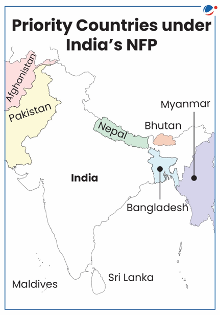Why in the News?
Parliamentary Standing Committee on External Affairs submitted an Action Taken report on observations/ recommendations contained in its 22nd report (submitted in July 2023) on India’s NFP.
About Neighbourhood First Policy (NFP)
- Neighbourhood First construct as a policy came around 2008.
- Aims to forge strong neighbourhood relations based on a consultative, non-reciprocal, and outcome-oriented approach.
- Focuses on delivering benefits like greater connectivity, improved infrastructure, stronger development cooperation in various sectors, security and broader people-to-people contacts
- It is a dynamic policy that adjusts to our renewed interests in the region, and to evolving regional circumstances.

Significance of NFP
- Strategic imperative: Enhanced regional integration in South Asia is important to counter external influence such as of China and promote India’s vision of free and open Indo-Pacific.
- Cooperation within neighbourhood is also critical for India to voice for reforms of Global Governance system and institutions such as UNSC, IMF, etc.
- Strengthen multilateralism: It will help strengthen multilateralism through regional/ sub-regional organizations such as SAARC, BIMSTEC, etc.
- Soft Power: India’s rich cultural and historical ties with its neighbours helps to promote its diverse cultural values and soft power influence in the region.
- Successful management of regional relationships marked by peace and cooperation positions India as a responsible and constructive actor, which is crucial for India’s aspirations of global leadership.
- Regional stability and security: Improved trust and cooperation builds capacity to address traditional and non-traditional (resource scarcity, illegal migration, climate change, etc.) security threats.
- Collaboration vis-à-vis anti-terrorism efforts, counter-insurgency operations, transnational organized crimes, etc., is important to ensure security and sovereignty and territorial integrity of India.
- India pursues the Security and Growth for All in the Region (SAGAR) Vision for it.
- Economic: Facilitates increased regional trade, investment, and cross-border infrastructure leading to economic growth, employment generation, and improved standards of living.
- It is also important to ensure India’s energy security, particularly in the context of northern neighbours – Nepal and Bhutan – with significant hydro-power potential.
- Active outreach with neighbours is also important to address developmental deficit in India’s Northeast. e.g., Kaladan Multi-Modal Project, Akhaura-Agartala Rail Link through Bangladesh, etc.

Challenges in India’s Neighbourhood
- Historical baggage and unresolved disputes: Unresolved border disputes with countries like Pakistan results in frequent tensions and mistrust.
- It also, sometimes, results in anti-India sentiments in the neighbourhood and strained bilateral relations due to perceived ‘Big-Brother’ attitude due to India’s size and strategic position.
- Domestic politics: India’s domestic politics and federal dynamics also act as a determinant with its neighbourhood. e.g., Tamil sentiments determining India’s Sri Lanka policy.
- Dynamics in neighbouring countries: Political instability, weak governance, and internal conflicts hinder sustained cooperation and implementation of long-term projects. e.g., Political instabilities in Afghanistan and Myanmar.
- Regime change in neighbouring countries also affects India’s bilateral relations with them. e.g., Recent tensions in India-Maldives relations after regime change in Maldives.
- Terrorism and illegal migration from neighbouring countries due to political instability and internal conflict results in increased threat of terrorist and militant attacks.
- India’s capacity and resources: Delayed implementation of development projects which can lead to frustration, mistrust and reduces India's influence in the region.
- Multilateralism: Dysfunctional regional multilateral institutions like SAARC affected by India-Pakistan tensions, limiting their capacity to promote regional cooperation.
Key Recommendations by the Parliamentary Committee
- Implementation of developmental projects: MEA should establish a Cell to identify specific initiatives, projects and programmes to be taken up by various Ministries and Departments with our neighbouring countries.
- Strengthen Joint Project Monitoring Committees and Oversight Mechanisms for monitoring progress of various development assistance projects for their timely execution.
- Border infrastructure and connectivity: Increased investment, pooling of resources and above all, convergence of everybody’s interest and focus by various central agencies for regional infrastructure development of the border areas.
- MEA should work in close coordination with the Union Ministry of Home Affairs and state governments to address illegal migration and monitor demographic changes in border areas.
- Development Fund: Explore feasibility of setting-up a regional development fund for connectivity infrastructure under regional frameworks like BIMSTEC.
- Also explore the feasibility of creating a Disaster Relief Fund on the lines of the COVID-19 Emergency Fund under the aegis of NFP.
- Cultural and People-to-People connect: Scale-up academic cooperation, special scholarships schemes and exchanges in the fields of performing/fine arts undertaken by Indian Council of Cultural Relations (ICCR).
- Promote investment in tourism, including medical tourism under the NFP.
- Bilateral and multilateral/ regional framework: Periodic review on the basis of contemporary realities and upgrade, strengthen and energize these mechanisms on a continuous basis.
- Synergy with Act East Policy: MEA to maintain a synergy between NFP and Act East Policy as it holds significant potential to bring about connectivity, economic development and security of the North-Eastern Region.



